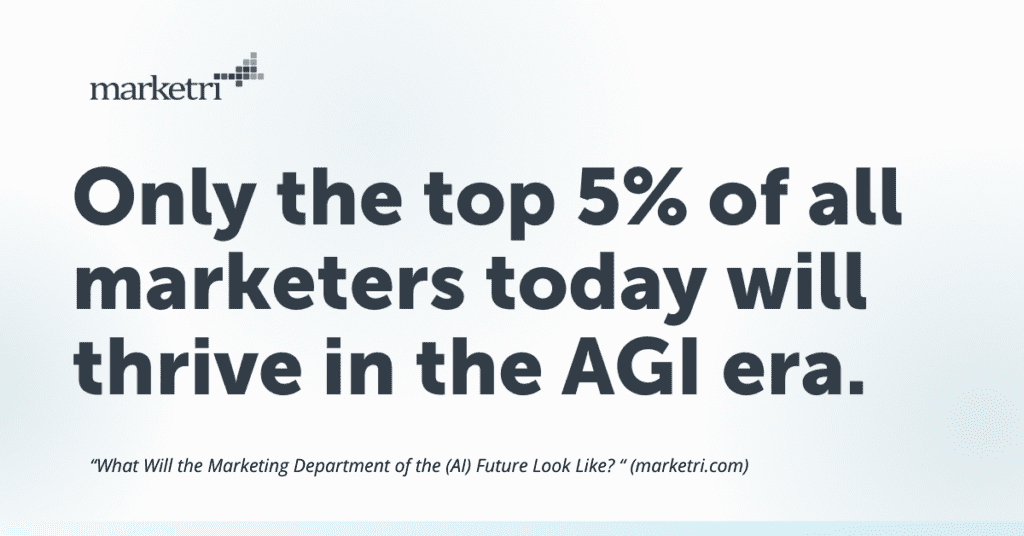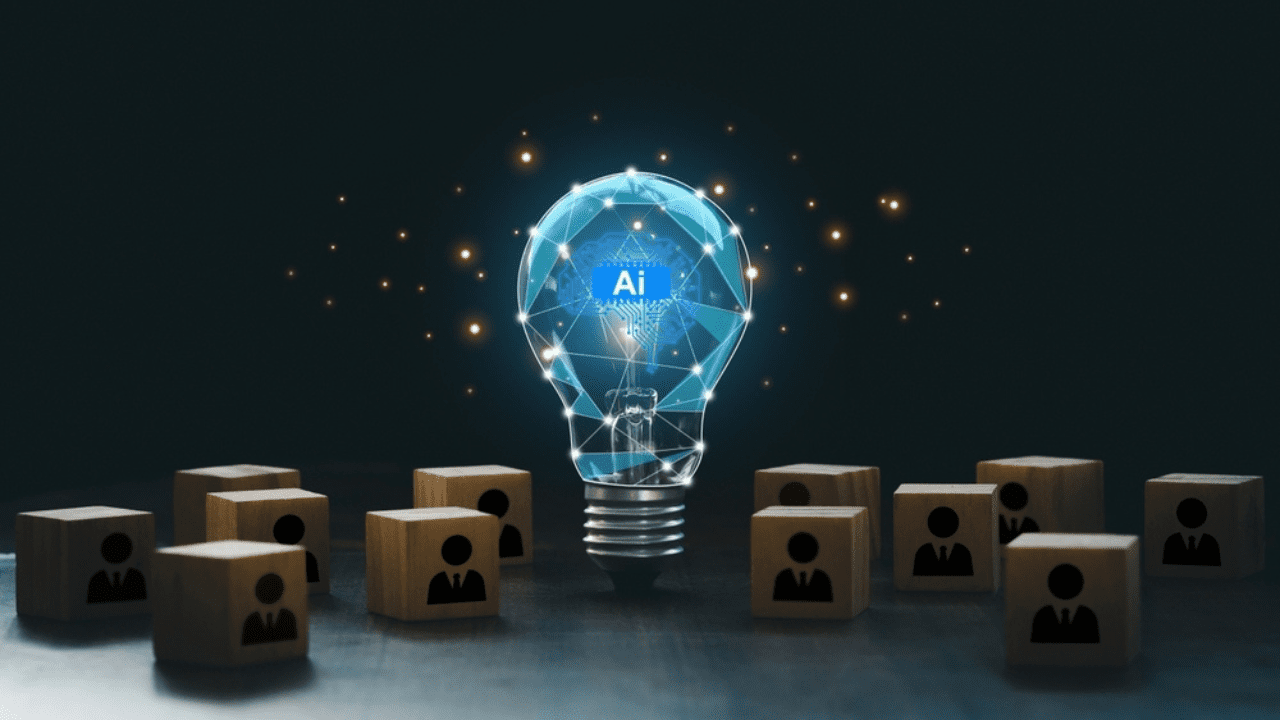What Will the Marketing Department of the (AI) Future Look Like?
As marketing continues to evolve, the rise of generative AI and, eventually, AGI will redefine roles, responsibilities, and strategies—demanding a fresh perspective on how marketing teams operate and the skills they need to succeed.
Part 1 of my series on Reimagining the Marketing Department explored how this function has evolved over three decades, bringing us to the advent of AI-powered marketing.
Here’s what’s coming next and how you can prepare—whether you’re a mid-sized business with a lean staff, a large company with many FTEs, or a marketing professional.
Forget the Traditional Marketing Roles
As I explained in Part 1, marketing experienced a seismic shift from the 1990s to today—from traditional marketing to digital, from the dominance of solo marketing generalists to the age of hyper-specialists. And the tide will turn again in lockstep with the adoption of generative AI and eventually AGI (alternative general intelligence—AI that matches or exceeds human intelligence).
AI is poised to transform every type of knowledge work, including marketing. And it’s already altered how your buyers search for a solution provider. Amidst this massive change, thought leader Marcus Sheridan says the status quo won’t cut it anymore in marketing. Like me, he believes that in an age where AI is upending everything, marketing will become much more “rooted in creativity, outside-the-box thinking, and disruption.”
That means the marketing function will look entirely different than it does today…sooner than you think.
- We’ll need fewer copywriters. AI-powered tools will automate routine tasks like drafting blogs on straightforward topics and social media posts…leaving little demand for lower-level copywriters. Only the top-tier content developers will survive and thrive: the professionals who understand strategy, are engaging storytellers, and know how to tap human emotion to spur action. They’ll become masters of AI-enabled tools as they focus on tasks that demand creativity and critical thinking.
- We’ll need fewer SEO specialists, too. As I explored in this blog, your buyers are likely using ChatGPT and other AI-enabled tools to bypass traditional search engines (sorry, Google!), to eliminate the heavy lift and get curated answers faster. As the tried-and-true search process goes away, we’ll need fewer tacticians to do keyword research and more strategists who can optimize results from AI-powered search tools. It’s no wonder job listings for SEO and SEM specialists declined 37% in 2024.
- Social media marketers will adapt or die. As AI gets really good at segmenting your audience, targeting social ads, and personalizing content, companies will need fewer professionals to handle these mechanics. Instead, they’ll look for marketers skilled in strategic thinking and building audience engagement.
- AI-enabled analytics will shift roles. AI excels at processing and analyzing massive data volumes. That means we’ll rely less on traditional data analysts and more on strategists who can interpret AI-driven insights and apply them to drive better marketing results.
Wait…Are We Back to the Days of a Solo Marketing Generalist?
Definitely not.
We won’t need the army of specialists the marketing field employs today. But the AI-savvy marketers of the future will bear little resemblance to the generalists who once dominated mid-sized company marketing departments.
Instead of searching for a single person with enough technical skills to dabble in many marketing specialties, businesses will prize marketers who offer a very different type of complete package: Professionals who are creative and strategic, adept at leveraging data-driven insights and synthesizing inputs, with deep business acumen and superior collaboration and influencing skills.
The result will be a much leaner team of business savvy, tech slaying, strategic thinkers with the depth and breadth of capabilities to drive marketing that delivers exceptional outcomes.
Yes, transformative change is coming to your marketing function. But when and how will it affect you?
The Future of the Marketing Department
2025-2027: The Transition Years
Expect a lot of disruption in marketing during this period as Gen AI automates tactical work, supplements human efforts, alters existing roles, and inspires new ones.
Here’s what that means:
- For big companies with in-house marketing departments: If you have a large internal marketing staff, it’s time to step back and assess what you’ll need as AI takes hold. Can you shift top performers from execution to strategy, oversight, brand alignment, and other high-value work? Should you limit or even stop hiring internal marketing specialists and junior-level generalists? How can you operationalize AI to your advantage? An AI-forward strategic marketing consultant can help answer those questions by performing an objective assessment, developing a short-term game plan, and creating a longer-term roadmap for your marketing function.
- For mid-sized companies with fewer resources: Use the fractional marketing model to gain access to all the skillsets and capabilities you need today, without building out a team of FTEs you won’t need tomorrow. It’s a practical way to gain agility amidst this rapid, dramatic change. And if you choose an AI-forward fractional agency, you’ll gain the added advantage of putting the power of AI to work to drive a higher marketing ROI.
- For marketing professionals: Your role is going to evolve, whether you’re currently a generalist or specialist, a strategist or tactician. Now is the time to level-up and right-size your skills, master AI-powered tools, and position yourself to thrive in a new world.
2028 and Beyond: The Era of AGI and AI Agents
Once AGI is ready for prime time, it will have a significant impact on how professionals approach marketing and how businesses staff this function. We’ll see a shift from AI tools that augment the work of humans for discrete tasks, to AI agents that collaborate with people and even act autonomously.
AI agents will be able to handle complex work and non-linear marketing tasks with little human intervention, even understanding nuanced context. They’ll become an extension of your team, working alongside and with your marketers in a synergistic relationship: Imagine a marketing professional and AI agent having a strategic discussion about how to capture new market opportunities or adapt your brand positioning as conditions change.
It’s a far cry from putting a prompt into Claude and getting a rough draft of your thoughts. And that means marketing roles will evolve once again.

Only an elite group—the top 5% of all marketers today, in my opinion—will thrive in the AGI era. They’ll apply a deep understanding of strategic marketing principles, channels, tactics and measurement, along with strong business acumen and a keen grasp of how marketing intersects with the rest of the business. And they’ll use those capabilities to ask penetrating questions, synthesize AI-driven outputs, and creatively apply insights to generate better business outcomes.
The new breed of marketer will be insatiably curious, unafraid of change, and adept at adopting fast-changing best practices to keep the business ahead of the competition. And they’ll possess two innate skills not easily replicated by AI (and not easily trained on): strategic thinking and creativity. They’ll be strategic conductors as opposed to solo performers. Not specialists, but certainly special, since there will be so few of them. Think of the most highly sought free agents in the NFL: That’s the caliber of marketer that will drive the best marketing ROI in the future.
Future-Proofing Your Marketing Department for the AI Era
The AGI era is just around the corner, and the time to prepare is now. Companies that use the next two years to gain AI proficiency and build AGI best practices will benefit in a big way: with sharper strategies, better insights, greater agility, faster time to market, and higher growth.
How do you get there?
Some large companies will take the path of right-sizing their in-house marketing function. They’ll build a small team of elite strategists uniquely equipped to leverage AI—first as an augmenter, later as a whole new team member.
Other companies—especially mid-sized businesses—will fully outsource to an AI-forward fractional marketing agency. They simply won’t be able to attract and retain the premier marketers of the future or keep pace with the overwhelming change and complexity of marketing.
Whenever you’re on the cusp of a major transformation, it’s both exciting and overwhelming. The benefits will be great. But it won’t be without challenges.
That’s why Marketri has been steeped in building AI fluency and capabilities: To help B2B companies develop a marketing function that powers their success in the AI age.
Are you ready to transition your marketing function for a new world? Schedule an introductory call with Marketri President Deb Andrews.





